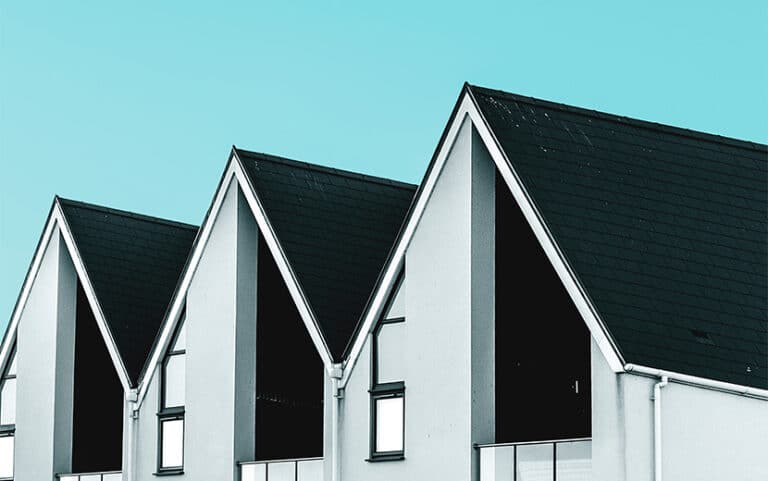Flat Roof vs. Pitched Roof: Choosing the Best Roof Type for Your Property
Aug 30, 2023
Flat Roof vs. Pitched Roof: Choosing the Best Roof Type for Your Property
Selecting the right roof type for your property is a crucial decision that can influence your home’s overall design, durability, and value. With numerous roofing styles and materials available, it can be challenging to determine which type best meets your needs and preferences. Among the various roof types, flat roofs and pitched roofs are two of the most commonly debated options, each offering its unique set of benefits and drawbacks. In this blog post, we will examine the differences between flat roofs and pitched roofs, discuss their advantages and disadvantages, and provide guidance from our experts at Honey Bees Roofing & Solar to help you make an informed decision.
Flat roofs and pitched roofs differ significantly in terms of design, materials, cost, and maintenance requirements. While flat roofs require less material and are often quicker to install, pitched roofs provide additional loft space and generally have more extended durability. However, it is essential to consider factors such as your property’s architectural style, local building regulations, climate, and budget when choosing between a flat roof and a pitched roof.
At Honey Bees Roofing & Solar, we are committed to guiding property owners through every step of the roofing process, from initial consultations to professional installation and maintenance. Our experienced roofing team is well-equipped to help you navigate the decision-making process and identify the best roofing solution tailored to your needs, ensuring a perfect fit for your property.
In the following sections, we will delve deeper into the characteristics, pros, and cons of flat roofs and pitched roofs, aiming to highlight each roof type’s potential benefits and challenges. We will also discuss how Honey Bees Roofing & Solar can provide expert assistance in selecting the ideal roof design for your property and ensuring high-quality, durable, and aesthetically pleasing results.
Characteristics and Advantages of Flat Roofs
Flat roofs, as the name suggests, have little to no slope and are commonly found in commercial buildings and modern residential architecture. They typically consist of a waterproof membrane over a structural deck made from concrete, steel, or wood. Here are some of the key advantages of flat roofs:
- Space utilization: Flat roofs offer an additional usable space that can be converted into a rooftop garden or patio.
- Easy access: Their level surface makes flat roofs easier to access, maintain, and repair compared to sloped roofs.
- Cost-effectiveness: Flat roofs usually require fewer materials and less time for installation, resulting in reduced initial costs.
- Modern appeal: Flat roofs often complement contemporary home designs, providing a sleek and minimalist aesthetic.
Despite these advantages, flat roofs are more prone to water ponding, which can lead to leaks and structural damage if not adequately managed. Therefore, it is essential to consider proper drainage systems and regular maintenance to ensure the longevity of a flat roof.
Characteristics and Benefits of Pitched Roofs
Pitched roofs, also known as sloped roofs, are roofs with a noticeable incline. They are commonly used in residential construction and come in a variety of styles, such as gable, hip, and mansard roofs. Pitched roofs typically use materials like asphalt shingles, metal, wood shakes, or tiles. The following are some key benefits of pitched roofs:
- Enhanced water drainage: The sloping design of pitched roofs allows for efficient water runoff, reducing the risk of leaks and water damage.
- Increased loft space: Pitched roofs provide more attic space, which can be used for storage or converted into additional living space.
- Weather resistance: Pitched roofs can better withstand heavy rain, snow, and wind, making them more durable in extreme weather conditions.
- Architectural versatility: The variety of styles and materials available for pitched roofs enables homeowners to create a unique look that complements their home’s design.
While pitched roofs come with several advantages, they usually require more materials and labor for installation, which can lead to higher initial costs. Additionally, maintenance can be more challenging due to the sloping surfaces.
Factors to Consider When Choosing between Flat and Pitched Roofs
When deciding between a flat roof and a pitched roof, consider the following factors to determine the best option for your property:
- Architectural style: Your home’s design plays a significant role in choosing the right roof type. If you have a modern property, a flat roof might be more visually appealing, while a pitched roof might better suit a traditional home.
- Climate: The local climate can impact your roof’s performance and durability. If you live in an area with heavy rainfall or snow, a pitched roof’s ability to drain water efficiently may be more suitable. On the other hand, flat roofs are more common in dry, arid regions.
- Budget: Analyze the initial and long-term costs associated with both flat and pitched roofs. While flat roofs may be less expensive upfront, they may require more frequent maintenance and repair, impacting your overall budget.
- Space requirements: Consider the additional space provided by each roof type. If you are looking for extra outdoor living or storage space, a flat roof may be the better option. Alternatively, pitched roofs offer extra attic space, which can be utilized for storage or an additional living area.
How Honey Bees Roofing & Solar Can Help You Choose the Best Roof Type
At Honey Bees Roofing & Solar, our mission is to help homeowners make informed decisions about their roofing needs. Our experienced team is available to discuss the pros and cons of both flat roofs and pitched roofs, taking into account the unique requirements of your property, preferences, and budget. We can also recommend the best materials for each roof type, provide accurate estimates, and ensure high-quality installations. Whether you decide on a flat roof or pitched roof, we are here to guide you through every step of the process, offering expert advice and exceptional service, making your roofing experience stress-free and successful.
Conclusion
Choosing between a flat roof and a pitched roof is a significant decision that depends on various factors, such as your home’s aesthetic, climate, budget, and personal preferences. By understanding the advantages and disadvantages of each type, you can make a well-informed choice that best meets your needs. Our Honey Bees Roofing & Solar team is dedicated to providing comprehensive guidance and professional service, ensuring you make the right decision for your property.
If you require further assistance regarding flat roofs or pitched roofs, or if you’re ready to take the next step toward a beautiful and durable roofing solution, contact Honey Bees Roofing & Solar today for a consultation. The premier Burleson roofer is eager to help you find the perfect roofing solution tailored to your specific needs, guaranteeing long-lasting protection and appeal for your property.
